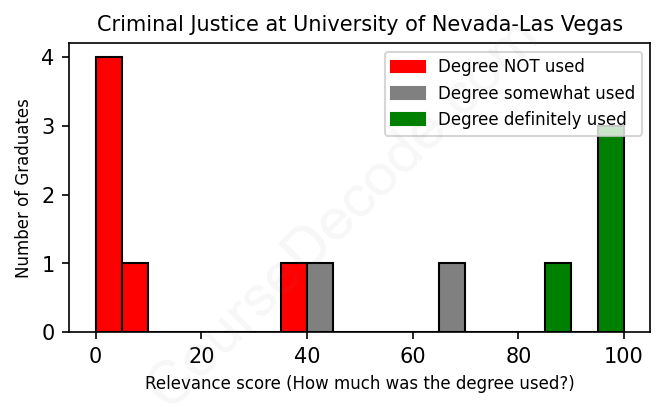
First, some facts. Of the Criminal Justice graduates from University of Nevada-Las Vegas we've analyzed , here's how many have used (or NOT used) their degree in their career:

These are estimates based on AI analysis of 12 LinkedIn profiles (see below).
The verdict? Bad. Overall, with an average relevance score of 45%, Criminal Justice graduates from University of Nevada-Las Vegas have a substantially lower likelihood (-22%) of finding work in this field compared to the average graduate across all fields:
And for comparison, here's the chart for all profiles we've looked at across all degrees.
Also, after graduating, 41% of these graduates have pursued further education other than another Bachelor's degree (such as a Masters degree or other), compared to the average across all profiles of 35%. This suggests you may need more than just a Bachelors degree to be competitive as a Criminal Justice graduate.
See the details:
|
Relevance score: 100% We think this person has gone into a career highly relevant to their degree. We think this person has gone into a career highly relevant to their degree.
DEGREE INFOGraduated in 2021 from University of Nevada-Las Vegas with a Bachelor's degree in Criminal Justice. Also pursued further education since (see below). JOB HISTORY SINCE GRADUATIONAssociate Forensic Solutions LLC Jun 2023 - Present FURTHER DEGREES DONE SINCE GRADUATINGMaster's degree SeekingUniversity of Nevada-Las Vegas 2022 - 2024 ABOUTNo information provided. |
The top 10 most common jobs done by the graduates we've analyzed (ranked most common to least) are:
Looking at the job history of graduates from the University of Nevada-Las Vegas with degrees in Criminal Justice, it seems most of them have ended up in roles that don't really tap into what they studied. You’ve got a lot of positions that are either in hospitality, like bartending, or administrative roles, which aren't connected to criminal justice fundamentals. Many alumni have taken on jobs like management trainees, supply chain roles, or tech positions, which focus more on operations and customer service rather than anything law-related. Even when some positions have a hint of relevance, like in compliance or administrative duties, they often lack the core knowledge that you'd expect to use when working in criminal justice settings.
However, there are a few standout positions that truly relate back to their degree. Some graduates did find work as law clerks or in roles closely tied to the legal system, like being a police dispatcher or case manager. These jobs directly involve criminal justice knowledge and skills, so they definitely represent the exceptions in a sea of more unrelated roles. Overall, while some graduates have managed to secure positions that align well with their education, a significant number have drifted into careers that don’t fully utilize their criminal justice expertise. It just goes to show that sometimes, a degree doesn’t always lead you down the most straightforward path in your chosen field.
Here is a visual representation of the most common words in job titles for Criminal Justice graduates (this is across all Criminal Justice graduates we've analyzed, not just those who went to University of Nevada-Las Vegas):

When looking at the career trajectories of graduates from the Criminal Justice program at the University of Nevada-Las Vegas, it's clear that there is a mix of paths folks have taken after graduation. For many, their first jobs seem somewhat varied, with positions in unrelated fields like bartending or administrative roles at local government offices. It shows that not all graduates immediately landed jobs directly tied to criminal justice. However, there are a few standout examples, particularly in law-related jobs and positions within local law enforcement, which reflect a more direct connection to their studies. For instance, some graduates took on roles such as dispatch specialist for the police department or law clerks, demonstrating that a portion did follow their education into careers in criminal justice.
Fast forward five to ten years, the picture becomes even more interesting. Some graduates who started in entry-level or unrelated roles transitioned into positions with greater responsibility and relevant focus, like attorneys or managers in compliance and security. Although not all may see a straight upward trajectory within law enforcement or the legal field, others have diversified into intriguing roles like talent acquisition strategist or customer success manager, especially those who perhaps pivoted from their initial career goals. That said, it isn't all sunshine and rainbows; there are graduates that seem to have drifted further from criminal justice, indicating that while the degree provides some foundation, the path can lead to various unrelated fields. Overall, while there is a good number of graduates who navigate into relevant career tracks, there's also a significant mix of pathways that aren't strictly tied to criminal justice, which could be something to consider if you're weighing your options in this field.
Honestly, a Bachelor’s degree in Criminal Justice at the University of Nevada-Las Vegas, like many schools, can be considered on the easier side compared to some other majors. You’ll cover interesting topics like crime theory, law enforcement, and the justice system, and the workload is generally manageable. It involves a fair bit of reading, writing, and some group projects, but it usually doesn’t dive too deep into complex math or science concepts. If you have an interest in the subject and stay organized, it’s definitely doable and can be a lot of fun! Just be prepared to engage with the material and participate in discussions, and you should be okay.
Most commonly, in the LinkedIn profiles we've looked at, it takes people 4 years to finish a Bachelor degree in Criminal Justice.
So, looking at these Criminal Justice grads from UNLV, you can see a bit of a mixed bag when it comes to money. The grad who climbed the ladder at Solar Turbines seems to be doing pretty well with a management role at their company now, which likely pays decently. On the other hand, some of the others, like those working in bartending or administrative roles, probably aren’t making bank, especially starting out. The legal grad who made it to attorney status likely saw a nice bump in pay too. Overall, while a few of them are on solid financial paths, others might be feeling the pinch, especially those in more entry-level or service jobs.
Here is a visual representation of the most common words seen in the "about" section of LinkedIn profiles who have a Bachelor degree in Criminal Justice (this is across all Criminal Justice graduates we've analyzed, not just those who went to University of Nevada-Las Vegas). This may or may not be useful:

Here are all colleges offering a Bachelor degree in Criminal Justice (ordered by the average relevance score of their Criminal Justice graduates, best to worst) where we have analyzed at least 10 of their graduates: